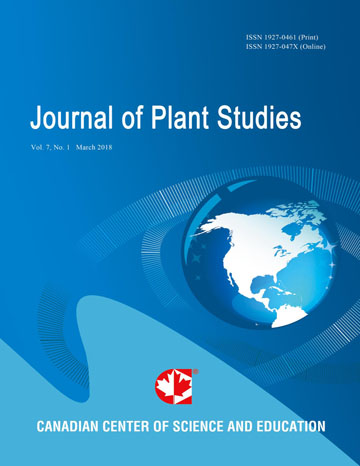Development of a New Method for Bioassay of Allelopathy Using Protoplasts of a Leguminous Plant Mucuna pruriens With a High Content of the Allelochemical L-DOPA
- Hamako Sasamoto
- Tomoka Murashige-Baba
- Aya Inoue
- Toshiko Sato
- Shinji Hayashi
- Ai Hasegawa
Abstract
To study allelopathy at the cellular level, we established a new bioassay method using protoplasts from etiolated leaves of a leguminous plant, Mucuna pruriens, which contains a large amount of L-3,4-dihydroxyphenylalanine (L-DOPA) and protoplasts prepared from cotyledons, leaves or roots of Lactuca sativa (lettuce) grown in an axenic condition. The bioassay was performed using 96 multi-well culture plates and required only a small volume of medium, 50 ?L, per well. For the mixed culture of Mucuna and recipient lettuce protoplast, the optimum condition was Murashige and Skoog’s basal medium, containing 1 ?M of 2,4-dichlorophenoxyacetic acid, 5 ?M of benzyladenine and 0.4 M mannitol solution. The inhibitory effect of M. pruriens protoplasts was found to vary with the density of the recipient L. sativa protoplasts. The M. pruriens protoplasts had no effect on the division of protoplasts from suspension cells of Oryza sativa. These results were in agreement with those obtained by the conventional plant box method. Our study offered a novel in vitro assay method, which will be widely applicable to study allelopathy of various plants on lettuce and also for quantitative studies between plant species under different culture conditions in order to simulate the possible future environmental risk.
- Full Text:
 PDF
PDF
- DOI:10.5539/jps.v2n2p71
Index
- AGRICOLA
- CAB Abstracts
- CABI
- CAS (American Chemical Society)
- CNKI Scholar
- Elektronische Zeitschriftenbibliothek (EZB)
- Excellence in Research for Australia (ERA)
- Google Scholar
- JournalTOCs
- Mendeley
- Open policy finder
- Scilit
- Standard Periodical Directory
- Technische Informationsbibliothek (TIB)
- WorldCat
Contact
- Joan LeeEditorial Assistant
- jps@ccsenet.org
